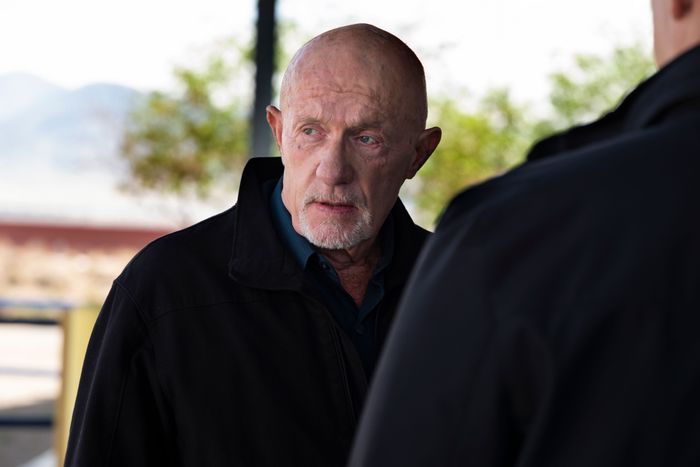
Werner was never able to see when the real danger was coming. He nearly soiled himself a couple episodes back while rewiring blast explosives, but couldn’t have been more composed waiting for Margarethe to arrive at Dulce Vega. The reality of his situation didn’t entirely sink in until he and Mike were eye to eye at the raceway, stuck at an impasse that would only come unjammed once Werner accepted his fate and took a bullet to the head.
The cruelty of life in Gus Fring’s employ was underscored less by Werner’s no-way-out conundrum than having had to belittle Margarethe in their final conversation in order to steer her back on a plane to Germany and clear from him. Then, like the narrator in Walt Whitman’s “When I Heard the Learn’d Astronomer” — the very text so admired by Gus’s protégé Gale Boetticher — Werner stared at those New Mexico stars in a silence so perfect it could only be shattered by a bullet cutting through air.
Several years later in Breaking Bad, Gale’s fate would mirror Werner’s, his face an unsparing foot or so from the barrel of Jesse Pinkman’s gun. Gale’s was a far more inelegant death, occurring in the doorway of his dim apartment rather than in some pastoral Whitman-worthy scene, and at the hands of a far more inexperienced and jittery assailant than Mike. In retrospect, it was only apt that Mike would wind up taking Jesse under his wing. Each man had, at some point, been compelled to join a support group only to lash out before leaving, and each had done terrible things for terrible bosses. Their unlikely mentor/mentee bond in BB’s back end was a kind of mutual redemption and recovery for them both, though as we know, Mike ultimately had too many wounds to heal.
The shift from Werner’s last stand to Gale’s first steps inside Gus’s meth lab was just as pointed, Gale’s enthusiasm overshadowed only by our melancholy over the insight into his violent end. It was never Gus’s intent to rid the world of his prized chemist pupil, but that script was written the moment Gale married his fantasies to Mr. Fring’s fortune, no different than Werner (or Walter White). The most stunning new information imparted was that Lavandería Brillante’s transformation into an criminal-architectural marvel was, schematically, Gale’s design, entwining his and Werner’s stories like polar ends of a constellation.
Far more indistinguishable were the finalists in HHM’s search for scholarship candidates in Chuck’s name, part of the façade orchestrated and paid for by Jimmy to anecdotally butter up the bar panel for his reinstatement-appeal hearing. Duncan Springer, Raymond Chin, Marcie Ramirez — all fine young students worthy of ensuring a steady line of heirs to the privileged circle of corporate-law elite (ring any timely bells?). But there was one applicant of distinction: Christy Esposito (Abby Quinn, who’s about to be a thing), a shoplifter (and we know Jimmy’s heart bleeds for pickpockets) made good whose essay spoke to her ambition toward using her legal ado as a catalyst for pursuing a better way. Jimmy can relate. He accosts her — hard. He pleads with her to forget about jumping through their hoops and cut corners until she carves out a lane that works for her, advice that was more or less terrifying for a teenager hopping the bus but instructive about what Jimmy would have wished for his younger self; the same mailroom kid who walked into the HHM library (indeed, the one that now bears Chuck’s name thanks to Jimmy’s $23,000 donation) and set about a journey to step out of his brother’s shadow inevitably doomed by roadblocks, sabotage, and self-defeat. He’d never win as Jimmy McGill. It’s not too late, however, for Saul Goodman to start scoring victories.
Kim is stunned speechless by Jimmy’s declaration that he was done practicing under his given name. More accurately, she was blown back by the fact that his seemingly impromptu waterworks and sentiment about Chuck before the board was the calculated performance of a stranger. There will never be a Wexler/McGill again, nor the compartmentalized escapism of Viktor and Giselle. Saul’s not simply a persona Jimmy’s trying on for size and fitting for three-piece pastel suits, but one he’s taking home from the office as his inner muse. He’s quieted the memories of karaoke with Chuck (though even in that otherwise poignant flashback, Chuck was still one-upping) and triumphantly harmonizing to ABBA while sleeping side by side. He’s rationalized away the good deeds Chuck may have done advocating for him in his professional aspirations and being tender with him in a fashion that modeled Jimmy’s own generosity as Chuck became ill. He was a sucker then, he reasons, but not now. He’s lost everything, but finally tasted a win. But as the legends of Gus Fring, Hector Salamanca, Walter White, and, yes, Gene Takovic attest, there’s nothing left but a slippery slope once the winner takes it all.
Apart From All That
• Ernie!
• Chuck!
• Was it supposed to be predictable that Jimmy was conning the bar?
• You might say Lalo is as agile as a … coati.
• Would Gus have ordered Werner killed had Lalo not gotten in the mix?
• The chaos Lalo can cause should be crucial next season.
• The selection of hot springs and resorts was a bitter echo of Jimmy’s Aspen v. Telluride et al spiel at S&C.
• Let’s hope Mr. Travel Wire man was just knocked unconscious.
• In that garage, Jimmy is literally stuck in Chuck’s shadow.
• The saddest part about Werner is he didn’t want it all — just a few days with his wife.
• This show might be more of a moral tale than even Breaking Bad.
• Thanks for reading and for all your comments and furious corrections all season. I read them and weep. (Mostly smile, but some weeping.)

